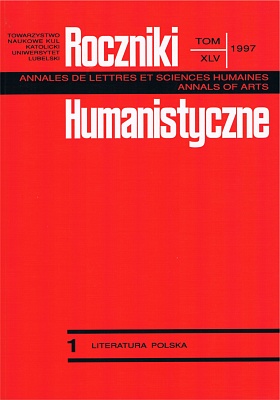Pawłowy prorok. O obrazie autora w Promethidionie Cypriana Norwida
Abstrakt
Out of the texts making up Norwid's manifesto to society emerges above all the figure of the prophet. Undoubtedly, this extends the tradition of romanticism which popularized the prophetic attitude in literature. The romantic prophet was uniquely capable of seeing and understanding reality: the present and, especially, the past. At times he became in his omniscience and omnipotence a rival of God. Now Norwid understood prophecy as a conveyance of the objectivized truth, not his own, although the truth he perceived and experienced in his conscience. The direct source of that truth was not − as in the biblical tradition − God, but indirect "instances," but worldly "last rays of prophecies": the wisdom of the eternal man or the plebiscites of ages, purified and objectivized opinion of mankind. The prophet of Norwid is the interpreter of the "signs of the time" sensitivized by suffering, who prophesies to limit suffering and "unnecessitate offering." One of the many, of whom St Paul writes in the First Letter to Corinthians. The attitude of Pauline prophet seems to be the principal attitude in the Promethidion. Art, surpassing the dignity of the bard, though closer to him, is the main theme of the work. The prophet's attitude converges other Promethean plots: gladiator, Socrates, to whom − apart from the structural allusions − draws on an extract from VII Epilogue. Eventually there is Prometheus-Adam, identified in the work with the eternal man and binding ancient and Christian traditions.
The attitude puts on a Christian sense on the Promethean problems, signalled in the title and abundant in European literature. It draws on to the two threads of the Promethean myth, fixed and conveyed to us by Aeschylus in his Prometheus Bound. The attitude preserves the motif of a prohuman revolt. The latter, however, is not aimed against God, as in Aeschylus and in many romantic embodiments of Prometheus (especially, in Shelley's Prometheus Unbound), but, on the contrary, in the name of God against everything that confines and hurts man. It also preserves a characteristic motif of talents and arts. They are, however, depicted not as a gift facilitating and making people happy on earth, but as a task supporting − in alliance with labour − the route of man and nation towards resurrection.
Copyright (c) 1997 Roczniki Humanistyczne

Utwór dostępny jest na licencji Creative Commons Uznanie autorstwa – Użycie niekomercyjne – Bez utworów zależnych 4.0 Międzynarodowe.





